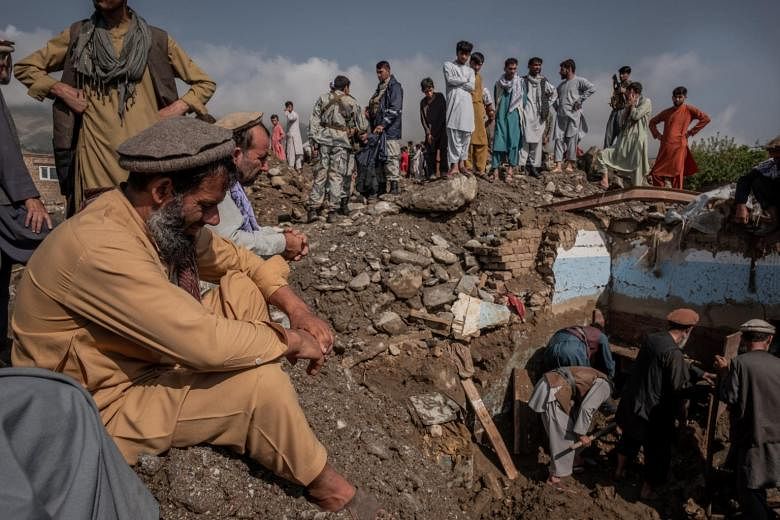CHARIKAR, AFGHANISTAN (NYTIMES) - Mr Hamid Agha's family was sleeping outside when the rain began.
He had witnessed torrential rain before during his two years living in Charikar, a city carved along the foothills of the Hindu Kush in northern Afghanistan, and thought little of it.
Yet when the family of 13 awoke on Wednesday (Aug 26), having moved inside their oppressively hot three-room home during the night, it was to the sound of floodwater.
Mr Hamid Agha, 50, was swept into the darkness. His wife and nine other family members were killed or are missing.
Their livelihood, an ageing green station wagon that he used as a taxi, was carried over half a kilometre away away, mangled, with water still leaking from its interior nearly 36 hours later.
As of Thursday morning, flash floods in Charikar had killed at least 92 people and injured 108 others, adding to the misery of a raging war and a coronavirus pandemic that has overwhelmed a health system that depends on aid organisations even for some of its most basic services.
Floods in northern and eastern Afghanistan are common this time of year. But the destruction in Charikar, where side streets were transformed into pressurised tributaries that tore through much of the city of 200,000 people, is striking.
The floods' toll, local officials say, is likely to rise as more bodies are discovered.
Flooding has been reported across a dozen provinces in the last several days, with more than 150 dead and 200 others injured, the Afghan ministry in charge of disaster response said.
Parwan province, of which Charikar is the capital, was the most severely hit.
Soon after news of the devastation in the city, President Ashraf Ghani sent his defence and health ministers to the area, with military forces helping in the search-and-rescue operations.
The Taleban offered condolences to the victims and instructed its fighters to assist.
But the group also attacked outposts in the area even as bodies were still lost under rubble, a continuation of violence that has escalated in the northern provinces in recent months, including some areas now affected by the floods.
Mr Abdul Shokoor, the governor of Bagram district in Parwan, said that the insurgents had attacked an outpost in the area in the pre-dawn hours and that civilians escaping floods in neighbouring Kapisa province had been caught in the crossfire.
The Taleban thought a vehicle passing through the area was bringing support to the Afghan outpost and opened fire, killing four civilians and wounding three others, according to the governor.
Mr Abdullah Abdullah, who leads the Afghan peace process for the government and who was visiting the area, lamented that the insurgents had not ceased fire even after the floods.
"In some areas, delivering assistance wasn't possible because of the fighting," he said.
Yet the disaster in Charikar was years in the making.
Many of the destroyed homes had been built or bought recently along flood routes, where the land was cheap.
Afghans who had lived on the city's outskirts as farmers moved to Charikar as the Taleban tightened their grip on the countryside and after a drought in 2018 withered the soil.
That was the case for Mr Hamid Agha, who grew wheat before moving to Charikar to evade the insurgency and the diminished return on his crop.
He spent his entire savings on his now buried home, he said, the only evidence of which he stared at on Thursday morning, crying quietly and surrounded by neighbours as an excavator removed rubble from the room where he had found his wife dead the day before.
"The flood has taken everything I owned and where I belonged," Mr Hamid Agha said.
"I was the only child of my family, so I always wanted to have a big family," he added.
"But now I lost everyone. Only my two sons remain."

Similar stories echoed across the city as residents walked among the wreckage of destroyed homes, overturned rocks and newly formed streets carved by the water.
Some homes had been torn in half, others almost completely erased.
Construction equipment from non-profit organisations and the Afghan government snaked its way into the city's interior as daily life tried to continue.
Mr Abdul Baqi, 38, looked on from the entrance of his grocery shop. His customers, mostly the more impoverished residents of the city who had bought land in the flood zones, were mostly nowhere to be found.
"I blame the people who sold these people the land," Mr Baqi said. "They should have told them how dangerous it was."
In Afghanistan, weak governance with little official oversight often means urban planning is neglected.
Ms Gul Bebe, 70, and her family, like Mr Hamid Agha's, had bought a house in the flood zone because it was cheaper, she said, as she balanced her way across the newly formed plateaus of rocks and detritus that was once part of a neighbourhood.
She said that they had had no idea of the risks.
"Now we lost everything here," she said.
At the hospital in Charikar, a compound of squat buildings at the base of the city, where the floods had carried debris down from the hills above, dozens of patients were stretched out, battered and bloodied with cuts and broken bones.
Some had suffered electrocutions. Several patients with head trauma had been evacuated to Kabul, Afghanistan, said Dr Khalil Haidari, head doctor at the hospital.
Outside the main building, Samir, a 10-year-old with a white bandage wrapped around a gash on his head and his uncles in tow, recalled the events of Wednesday morning.
"There was not much raining in the city, but then there was this big flood," Samir said. "I climbed to the wall and jumped to the house of my neighbour, and my parents handed my other siblings over, but they both were caught in the flood with my sister.
"My sister is still missing," he said, "and they found the bodies of my parents."

